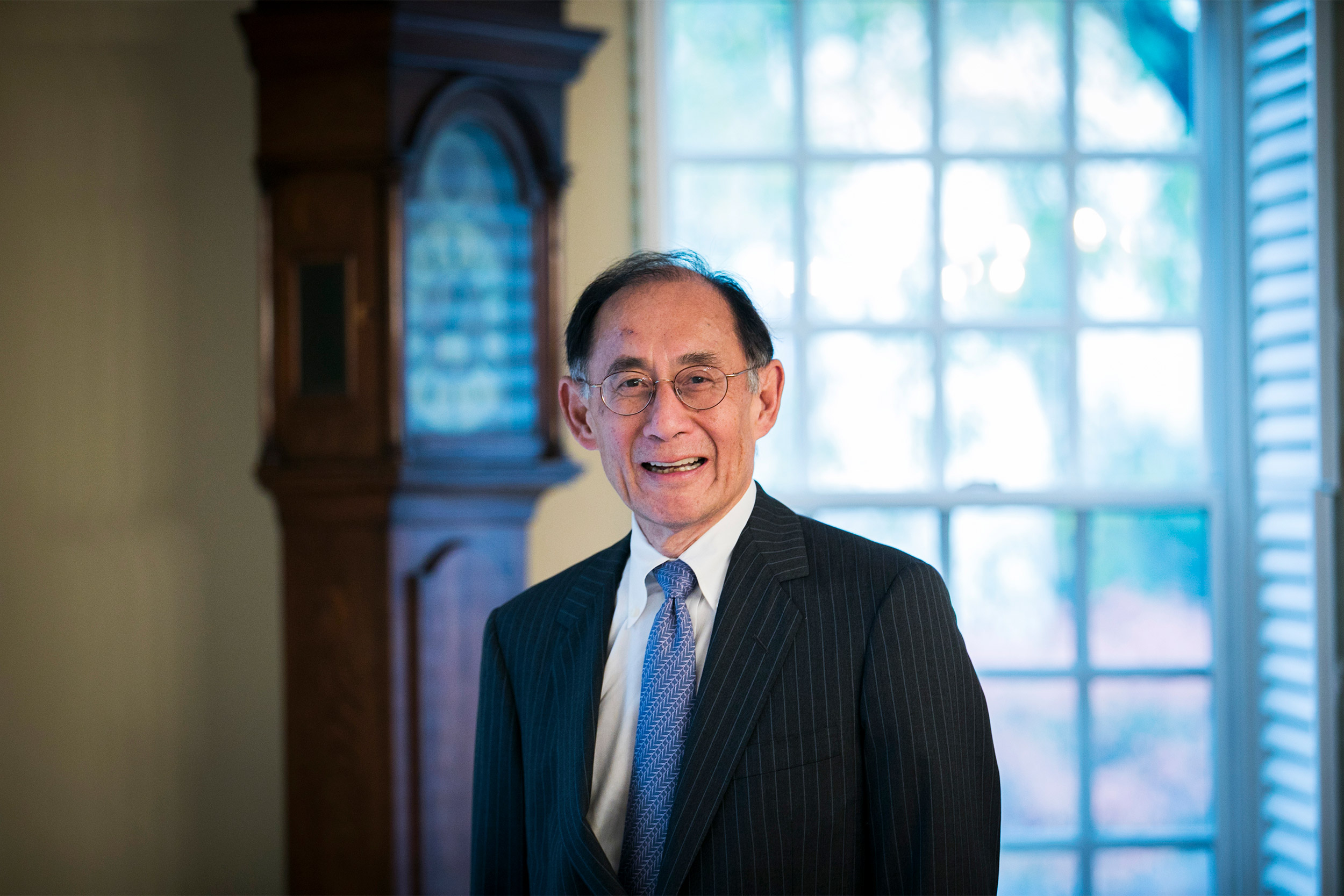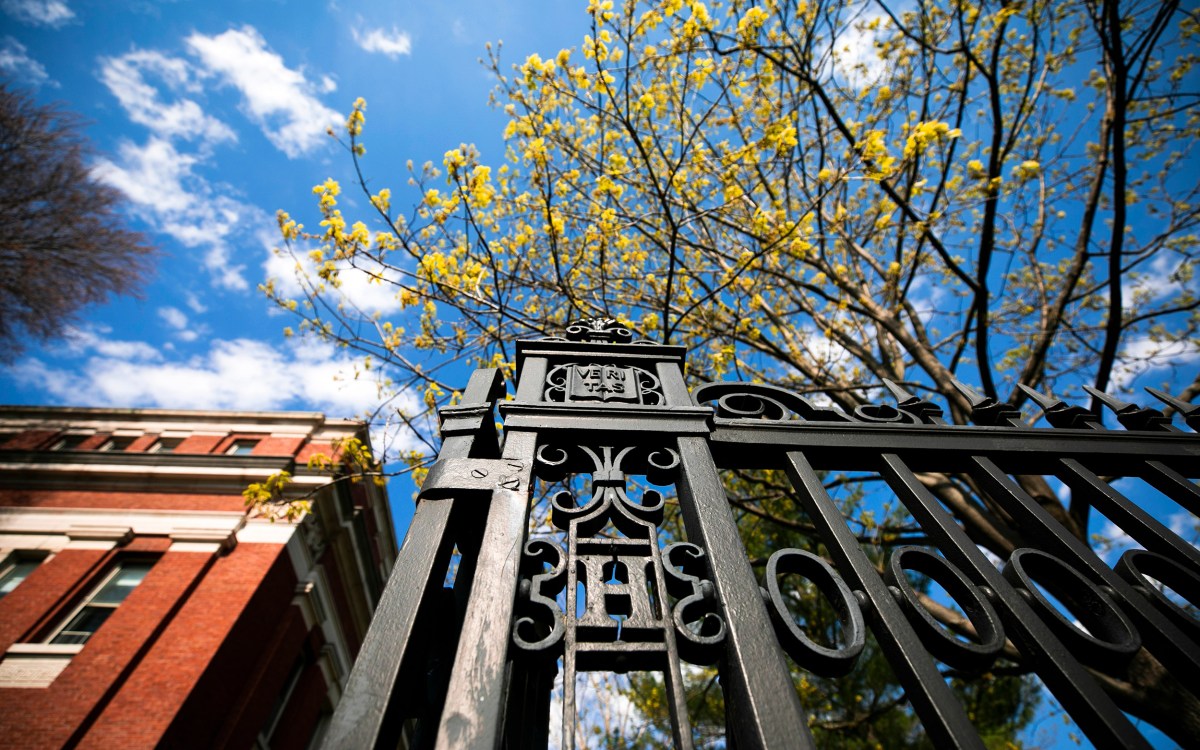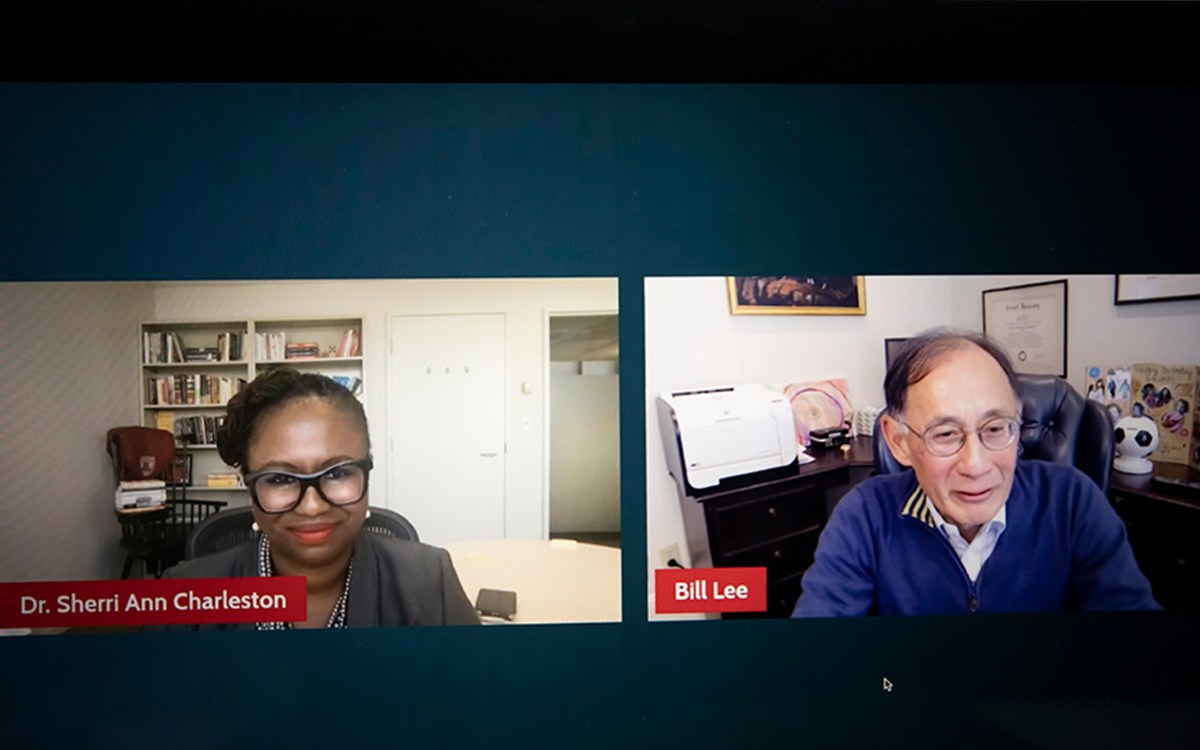
“Having been on the Corporation for 12 years and having been the senior fellow for eight, I can tell you I’ll miss it. It’s challenging; it’s exciting; and it’s fun,” said William Lee.
Kris Snibbe/Harvard file photo
Bill Lee on two decades of Harvard progress
Outgoing senior fellow says University’s values ensure bright future
William F. Lee will step down June 30 after nearly two decades of service on the University’s governing boards. He has served on the Corporation since 2010 and as its senior fellow since 2014. Previously, he was a member of the Board of Overseers from 2002 to 2008. He graduated from Harvard College in 1972 and, after attending Cornell Law School, became one of the nation’s top trial attorneys. He will continue to represent Harvard in the admissions lawsuit now before the U.S. Supreme Court, a case important for both the University and the nation. In an interview with the Gazette, Lee reflected on his time in Harvard’s leadership. Interview was edited for clarity and length.
Q&A
William Lee
GAZETTE: After 12 years on the Corporation, eight as senior fellow, you’ve helped lead the University through presidential searches, advancing its Allston vision, a pandemic, its reckoning with slavery, among many other things. What is most notable to you about your time in Harvard’s leadership?
LEE: What’s most notable for me has been the opportunity to participate in the selection of two wonderful presidents. The Corporation has no greater responsibility than selecting the president of the University and then doing everything the Corporation can to help the president become successful. I feel wonderful about the two people that we ended up selecting and what their tenure has brought to the University. Our ability to navigate the financial crisis and the pandemic, together with the daily challenges of being an institution like Harvard, is largely the result of their leadership.
Secondly, the governance reforms that we were able to develop and implement starting in 2010 allow the institution to function better on a daily basis. They also allow the Corporation to think more strategically — in the short term and long term — about what Harvard needs to do to ensure that it’s still Harvard 50 years from now, and that it is making the contributions to the local, national, and global communities that it should. The governance reforms roughly doubled the size of the Corporation. They put in place things such as the Corporation’s Facilities Committee and Finance Committee and have enabled us to bring together more experience and expertise to allow the Corporation to support the president, the provost, and the executive vice president in the day-to-day management of the institution. That has allowed the Corporation to focus more strategically on short-term and long-term imperatives: How are we developing Allston? What are we doing about artificial intelligence? What are we doing in the life sciences? What are we doing in the humanities? How are we addressing all the benefits and challenges of a demographically more diverse community? And how do we deal with unanticipated challenges like the pandemic? The reforms have allowed the Corporation to focus on issues like those in a meaningful way.
The third most notable development has been the role of the Corporation in helping drive the One Harvard initiative that Drew Faust put in place and that Larry Bacow has carried forward. The Corporation has become educated about what the different Schools are doing. It has been educated about the ways in which the Schools can work together. And it has helped drive the process of cooperation and collaboration across units where there should be cooperation and collaboration. The increased knowledge that the Corporation has about the different Schools and the increased information the Corporation has from interacting with the deans have allowed it to participate meaningfully in that process. That’s been a good thing.
“It’s hard to remain a pre-eminent academic institution for 10 years, let alone 400 years, but I’m optimistic that Harvard will, because the basic values of the University are clear.”
GAZETTE:You’re also experiencing now the 12-year presumptive term limit that is part of the governance reforms. Do you have any thoughts on that?
LEE: I think term limits are a good and necessary thing. For an organization like the Corporation, it’s critical that it constantly be refreshed, and that it have new people with new perspectives and different areas of experience and expertise. Since 2010, we have constantly been refreshed and there have been new people who have come to the Corporation with new ideas and new perspectives. That’s been a terrific thing. Having been on the Corporation for 12 years and having been the senior fellow for eight, I can tell you I’ll miss it. It’s challenging; it’s exciting; and it’s fun. But it’s also time for someone new to come in, to bring her own ideas about what the senior fellow should do, and to help drive the Corporation to its next iteration.
GAZETTE: What will you miss?
LEE: I’ll miss two things. I’ll miss the personal relationships with people whom I interact with on a daily basis. That includes the Corporation members, the president, the provost, the EVP, vice presidents, the general counsel, and the Loeb House staff. I’ll miss those personal relationships. The second thing is a bit more ethereal. There are so many events that you attend as senior fellow. You meet faculty or students or staff and hear them describe their work. It is just so extraordinary and interesting. What they describe is so far outside the realm of what a trial lawyer does on a daily basis that I just love the opportunity to hear about what they do. My brother is on the Faculty of Arts and Sciences, and I said to him once, “The great part about going to any event at Harvard is all you have to do is say to a person, ‘So what are you working on?’ and you’ll hear about the most extraordinary things.” I’m going to have to find a way to get that adrenaline shot of intellectual inspiration some other way.
GAZETTE: When you look to Harvard’s future, what do you see?
LEE: It’s hard to remain a pre-eminent academic institution for 10 years, let alone 400 years, but I’m optimistic that Harvard will, because the basic values of the University are clear. The people who come to the University — the faculty, the students, the administrators, the staff — are each in their own way committed to its fundamental mission: teaching, scholarship, and research in the pursuit of Veritas. And that fundamental mission is key to how our society is going to survive, to, in some sense, repair itself and move forward. I think there are a lot of hard decisions to be made as you look out 50 years, but we have the faculty, we have the students, we have the staff to make the decisions that will ensure the place remains extraordinary. And we also have the financial resources to help them achieve what we need to achieve.
“If you had come to me in 1970 and said, ‘Do you think you’ll ever be the senior fellow?’ I would have said, “What’s that?”
GAZETTE: Do you have any unfinished business, and do you plan to continue to be involved in the future?
LEE: I was managing partner of my firm for 12 years and, when I stepped down, I became a foot soldier just doing trials. I think it’s important that when you’ve been the leader of any institution, when your time comes to move on, you move on and you ensure there’s plenty of room for your successor — and in this case the next iteration of the Corporation — to do it their way. But I will stay involved. I’ll still be teaching at the Law School, and my day job will be just across the river.
On unfinished business, there’s a lot. How we develop Allston in a way that’s good for Harvard and also good for the Allston, Boston, and Cambridge communities is important. What we do with life sciences, with the hospitals, the Medical School, the Chan School, is critically important to Harvard. How we deal with diversity, equity, inclusion, and the suggestion that those values somehow conflict with the principles of free speech and free thought is important — because they don’t. They are complementary to each other and should be pursued in parallel, as essential elements of a larger commitment to excellence. At the more granular level, I think our strategic relationship with MIT is very important to our long-term future, to MIT’s long-term future, and to the Boston and academic communities. All of those things are incomplete. And if either of us lived another 50 years, they’re likely still to be incomplete. It’s important to recognize that these are all works in progress and will remain so. And if you think of it that way, you will always have the incentive to continually think of what happens next, what the next chapter is, and what we have to do to make sure that it comes out well.
GAZETTE: You’re the lead trial counsel on the Harvard admissions case. What are your thoughts on what’s coming?
LEE: It’s hard to predict. We’re likely to be heard at the beginning of October. As we have said in court, the demographic face of the Harvard community has changed, and we believe that’s a good thing. The diversity that we see by race, by gender, by geography, by socioeconomic status is a positive thing for the University and for the community. We remain convinced that is true. We have pursued that goal in a manner consistent with the Supreme Court’s principles, and we believe that we’ve consistently adhered to those principles. The vitriolic accusation that we discriminated against Asian Americans is simply not true. Two courts have found as a matter of fact that we do not. As I’ve said publicly, if I thought the University discriminated against Asian Americans, I would not have been the lead trial counsel. I’m a son of immigrants from China; it would be completely irrational for me to be the lead trial counsel in those circumstances.
The demographic face of the country is changing, and my prediction is that the academic world and educational institutions will continue to educate America as it is today. Whatever the Supreme Court says we need to do to achieve that goal, our job will be to find a way to do it.
GAZETTE: You were student here in the late ’60s and early ’70s. What would the Bill Lee of 1970 say if you told him he would one day be senior fellow?
LEE: If you had come to me in 1970 and said, “Do you think you’ll ever be the senior fellow?” I would have said, “What’s that?” I think I had the experience that many have had here. I came from a small public high school, and when I arrived here my dad — who was a theoretical physicist — put my belongings in my dorm in Pennypacker. Then he said, “Let’s take a walk.” We started walking and he said, “So, son, you’re going to be a scientist?” And I said, “I am, Dad, just like you.” We walked another few steps and he said, “Well, if you want to be a scientist, you need to be a deep thinker.” We walked another few steps, and we stopped right across from the Hong Kong restaurant. And he looked me right in the eye and he said, “Well, son, you’re not. You have other skills. You’re a really fine athlete. Change your major and something will work out.” I walked him to his car, and he went back to Philadelphia. I changed my intended major to economics the next day, and everything worked out.
I think I was like a lot of people who came here and believed that they didn’t belong. It took some time for me to feel comfortable that I did belong. And once you get some level of comfort, you realize the enormous opportunities that are here. I couldn’t have told you a thing about the Corporation. I could have told you barely anything about the president. But I could tell you that I was fortunate enough to have classes with physicist Harvey Brooks, Dwight Perkins, economist John Kenneth Galbraith, and Tom Schelling (who won the Nobel Prize in Economics). With time, I realized that there were these enormous opportunities here, and I should take advantage of them. I also began to realize that the single greatest benefit that you obtained from coming to Harvard was meeting your classmates — who have been my friends for life and who are now doing extraordinary things in many different ways.
GAZETTE: Do you have any parting advice for today’s students?
LEE: To the extent that you pause from time to time and ask, “Do I really belong here?,” the answer is: “You do.” With that in mind, I would recommend that you step back and look at the enormous opportunities here. Identify what your heart tells you that you would like to pursue, because no matter what your heart tells you, you will find that opportunity here. Take advantage of it, because what Harvard provides you in that respect is completely unique. It will make for a better Harvard experience, but it ultimately will make for a better lifetime experience for you.






